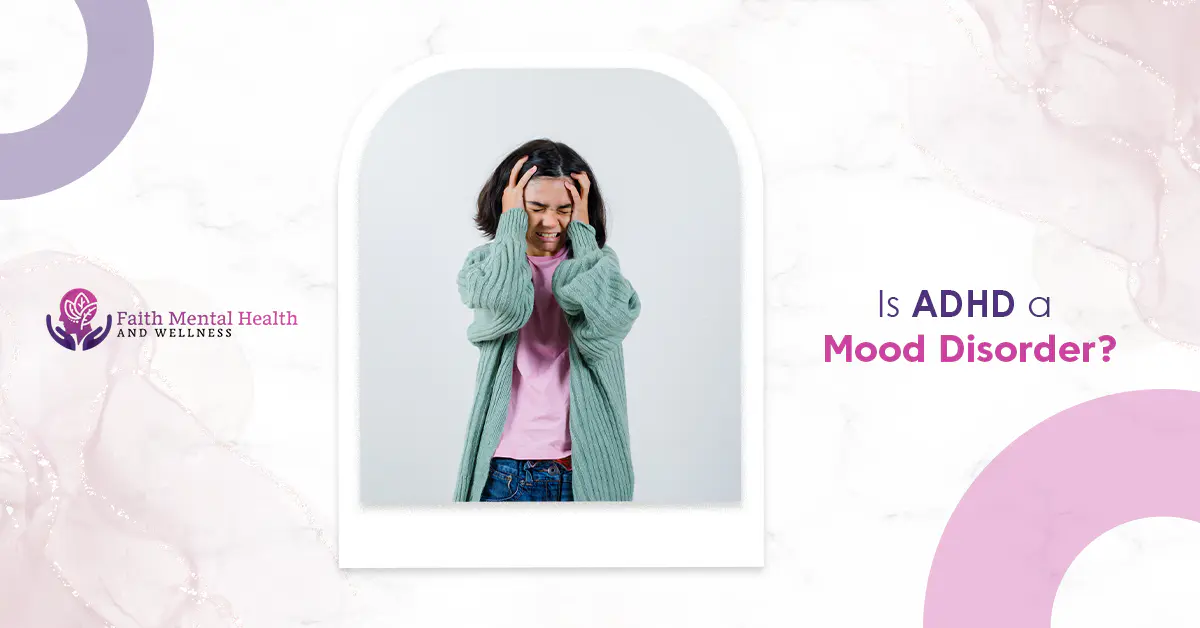ADHD occurs as a standard neurodevelopmental medical diagnosis, which individuals often mistake for other mental health diseases.
Several people question if Attention-Deficit/hyperactivity disorder belongs to the mood disorder classification.
So, is ADHD a mood disorder?
ADHD does not belong to the category of mood disorders despite its occasional overlapping symptom presentation.
At present, the link between ADHD and mood requires analysis because the relationship remains complicated.
Exactly What Is a Mood Disorder?
Mood disorders alter how someone regulates their emotions.
The diagnosis list includes:
• Major depressive disorder.
• Bipolar disorder.
• Dysthymia.
People struggling with these conditions exhibit constant shifts in their mood patterns from high moods to deep depression and continuous alternating phases between both states.
The Big Question: Is ADHD a Mood Disorder?
ADHD itself is not a mood disorder. Though, it can cause difficulties in emotional management among those who have the condition.
The shared features between ADHD and mood disorder symptomatology generate uncertainties for people who wish to understand this relationship.
ADHD and Mood Swings
The emotional experiences of those with ADHD might lead others to perceive them as having mood swings.
But can ADHD cause mood swings on its own?
True bipolar disorder mood swings do not stem from ADHD, but emotional dysregulation can make basic life events lead to significant feelings of frustration, irritated states, and depressive moods.
The distinctiveness between ADHD diagnosis in adults and children should also be addressed.
Many adults develop challenges with irritability and sensitivity to criticism while experiencing an ADHD diagnosis.
Diagnosing accurately these overlapping symptoms is essential because they can imitate symptoms of a comorbid mood disorder that includes depression or anxiety.
Why ADHD and Mood Disorders Oftentimes Co-Exist
The relationship between ADHD diagnosis and co-existing disorders remains very strong.
Other mental disorders related to adult ADHD increase emotional difficulties, thus creating a mistaken impression that ADHD represents a mood disorder.
Still, the reality is that ADHD is not a mood disorder.
Studies also suggest a biological link.
Dopamine, together with serotonin, works as a brain chemical messenger for ADHD management as well as for maintaining mood balance.
The overlapping brain chemical activity between ADHD and mood disorders helps explain their common occurrence together.
Treating ADHD and Mood Challenges
The proper treatment involves identifying the fundamental causes of the condition.
Treatment options help most patients handle their symptoms. Options can be:
• Therapy.
• Medication.
• Pharmaceutical intervention.
Doctors prescribe stimulant drugs to patients with ADHD because these medications help improve their focus.
Doctors might treat patients with comorbid mood disorders through their administration of stabilizing agents and antidepressants.
Behavioral therapy shows people how to handle ADHD and mood swings, thereby helping them build emotional strength, which reduces daily struggles.
Early diagnosis of a comorbid mood disorder becomes essential because it helps stop the symptoms from deteriorating.
Having both ADHD and challenges with your mood requires the expertise of trained mental health professionals for a significant transformation to occur.
Professional diagnosis is essential in handling both conditions to prevent wrong diagnoses from leading to improper therapeutic choices.
The Bottom Line
ADHD does not fall under the category of mood disorders, even though the conditions often appear together.
People with ADHD experience significant emotional challenges since mood disorders might accompany their ADHD, which can add complications.
The health and wellness of patients require comprehensive care to manage ADHD as well as any present mood disorders.
Get Treatment at Faith Mental Health and Wellness
The professionals at Faith Mental Health and Wellness provide support for all people dealing with ADHD and mood disorders and other mental health conditions.
Our experienced specialists will help determine precise diagnoses followed by personalized treatments.
Book an appointment today.
FAQs
What are ADHD moods?
People with ADHD experience emotional sensitivity combined with struggles to control their emotions, which we define as ADHD moods.
The experience results in powerful emotions, though it fails to match the criteria for bipolar disorder mood swing symptoms.
What disorders are associated with ADHD?
Patients who have ADHD commonly face additional psychiatric problems that might include:
• Anxiety.
• Depression.
• Oppositional defiant disorder (ODD).
• Bipolar disorder.
The medical term for such conditions is comorbidities.
How are comorbid ADHD and bipolar disorder treated?
Medical treatments usually combine to help patients manage their ADHD and bipolar disorder symptoms independently.
A mental health professional should lead this specific approach.


